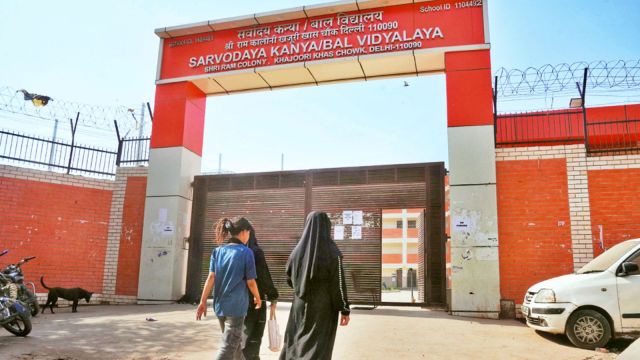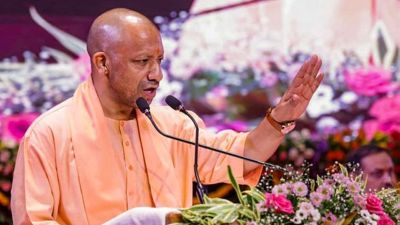‘Dua answered’: Supreme Court nudge, Rohingya kids go to school in capital
The past couple of years had been filled with setbacks and rejections from the school authorities, says Roshida, a Rohingya refugee who lives in a one-room house with her four children in Khajuri Khas, next to eight other similarly displaced families.
 Afna and Noor head to school along with their mother Roshida Begum, in Delhi’s Khajuri Khas on Friday. (Photo: Abhinav Saha)
Afna and Noor head to school along with their mother Roshida Begum, in Delhi’s Khajuri Khas on Friday. (Photo: Abhinav Saha)Twelve-year-old Afna is not used to waking up early because she has never gone to a school before. So, on Friday morning, her first day ever at school, she arrived late.
As tears welled up in her eyes, Afna’s mother Roshida Begum, 30, a single parent, described that moment as a “dua (prayer) answered”.
The past couple of years had been filled with setbacks and rejections from the school authorities, says Roshida, a Rohingya refugee who lives in a one-room house with her four children in Khajuri Khas, next to eight other similarly displaced families.
In December last year, the Delhi government had asked schools to “prevent” the enrolment of “illegal Bangladesh migrant” children and to inform the police in case of doubts over a child’s citizenship status. Despite numerous attempts to secure schooling, children of Rohingya refugees were denied admission due to their displaced status.
However, in response to a plea by 19 Rohingya children, the Supreme Court intervened on February 17 this year, instructing them to apply for admission to Delhi government schools.
In case of denial of admission, they were advised to move the Delhi High Court. By February 25, their applications were submitted to and accepted by the Sarvodaya Kanya/Bal Vidyalaya in Sri Ram Colony.
For Roshida, as Friday morning dawned bright and clear, it was a new day and a new start.
Ten minutes before school started at 7.30 am, Afna rubbed her eyes, listening closely to her mother’s instructions. Her three siblings, meanwhile, were fast asleep, tucked under a thick single blanket on the floor.
“Get ready as fast as you can,” Roshida instructed, struggling to locate her niqab (veil).
Pointing to the majority of their belongings, packed into small cloth bundles, Roshida explains, “We just shifted to this house yesterday. We lived a few gullies away before that. Our landlord asked us to vacate his house over lifestyle differences, like cooking habits.”
She acknowledged that the “only silver lining” for her at present was that two of her four children had got admission to a “good school”.
While her older son, 14, has not applied for admission to school, her elder daughter Noor, 16, does not qualify under the Right to Education (RTE) Act and has been asked to come to school on Saturday.
On what drove Roshida and her children to seek refuge in India, she says, “I am still haunted by the memories of the violent clashes in 2017 that brought us to India. Three of my nephews were killed and our house in Maungdaw (in Myanmar) was burnt down.”
Without showing any visible reaction to the discussion around her, Afna gets ready for school. With no school bag, uniform and books, she slips into a blue top and black jeans. “I discovered just last night that I was going to school today. I don’t have a school bag or books… lekin pata chalte hi bahut khushi hui (I was elated to learn that I was going to school today). My younger brother (Umar) has also joined (the school),” says Afna.
Beaming with excitement, Afna stepped out of the house, only to be joined by seven-year-old Umar, who got admission to Class 2.
Having just woken up, he couldn’t resist poking Afna and running behind her, besides trying Rashida’s patience by chanting “Ammi” on repeat as they prepared for the day ahead.
“Her brothers went back and forth to the school to get the form, to submit them and …to help with her admission. They couldn’t be happier,” Roshida said, walking alongside Afna.
As they crossed the narrow lanes, they were stopped occasionally by curious passers-by, who asked if they were headed to school.
Unlike the children rushing past in uniform, however, Afna held just a bag filled with documents, including her refugee card, “just in case they were required”. Umar, who was also excited about starting school, attended the evening shift later.
However, her first day at school was hardly straightforward. At the school, Afna was asked to “go back home” since she was late and not dressed in uniform (a salwar-kameez). In fact, she was advised to return the following day.
Around 9 am, Afna was called back to school. This time, she was accompanied by her sister Noor, who seemed hesitant. Being the eldest, Noor had numerous concerns.
At this, Roshida exclaimed, “Noor, get dressed to go to school. If you don’t go today, this chance may never come again.”
Stating that she would “go to school now if she had the chance”, Roshida added, “I couldn’t go to school because I got married. Once you’re married, you will only have time to raise children and look after the family. If you don’t have the naseeb (fortune) to get a good husband, Allah only knows what will happen — you will look here and there for work. Where will you find a job without an education?”
Still hesitant, Noor replied, “I want to go to school… but at this age, I don’t know if they’ll take me. It’s scary to think which class I’ll even join. Will I even fit in?”
On how prepared the school was to take on children who had never gone to school earlier, a senior school official said, “We are used to getting children who have either never enrolled in a school before or are dropouts since there are provisions for ‘Out of School Children’ and admissions under the RTE. This is not a new experience for us but there will be challenges. We need to see how much the children can mainstream themselves to their age-appropriate classes. If any child is found to be too weak academically, the Special Training Centre (STC) teachers take care of their issues.”
Stating that “we won the battle for the right to education”, Ashok Agarwal, an advocate at the Delhi High Court, said, “These vulnerable children have been kept out of the school system in the past for no fault of theirs, despite having the constitutional and statutory right to the Right to Education in a government school.”







